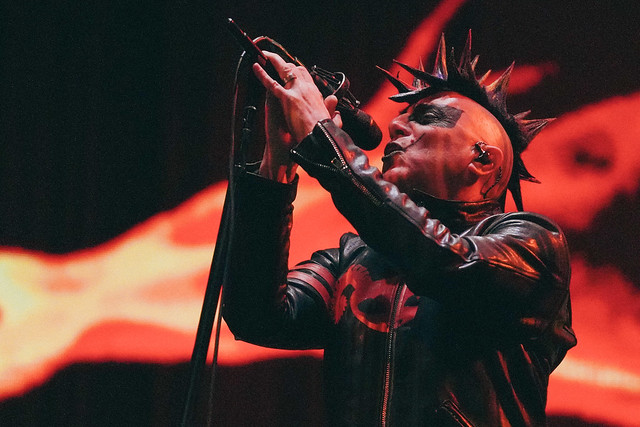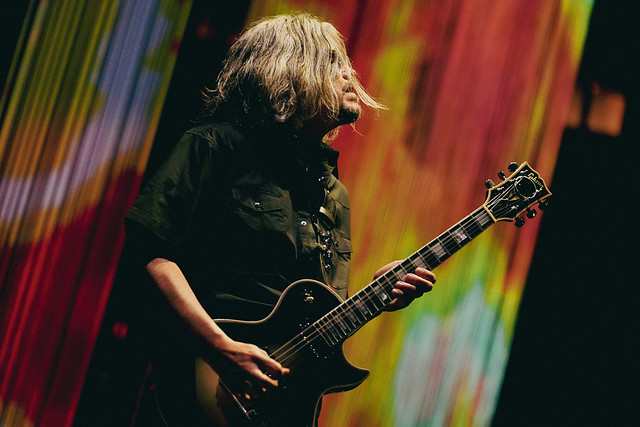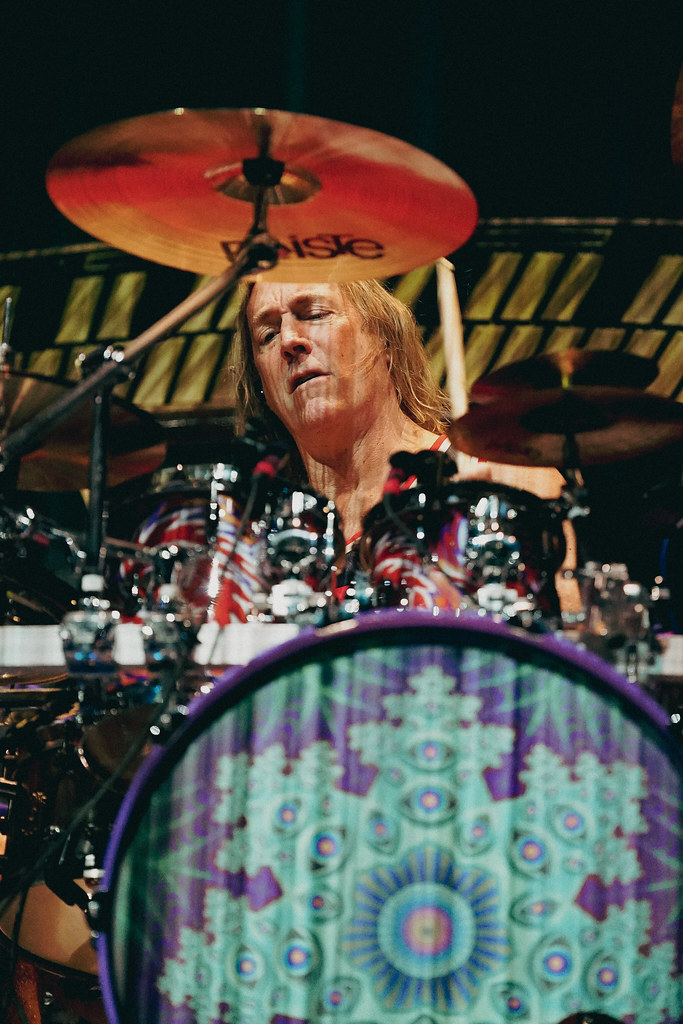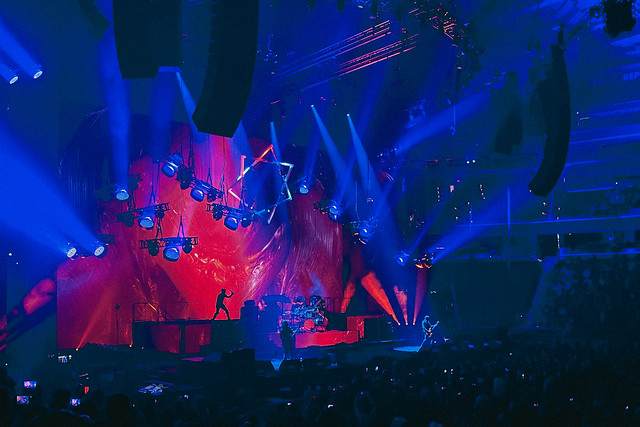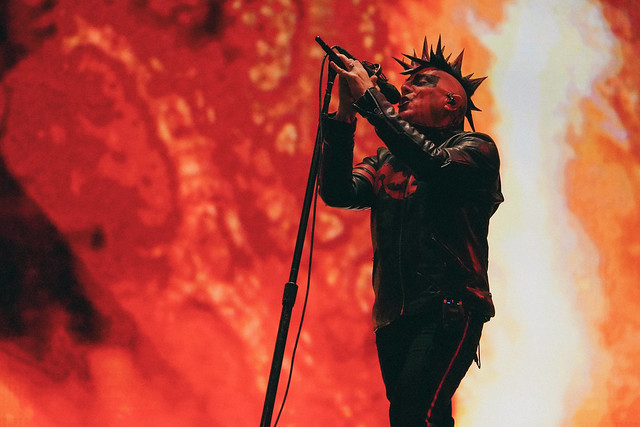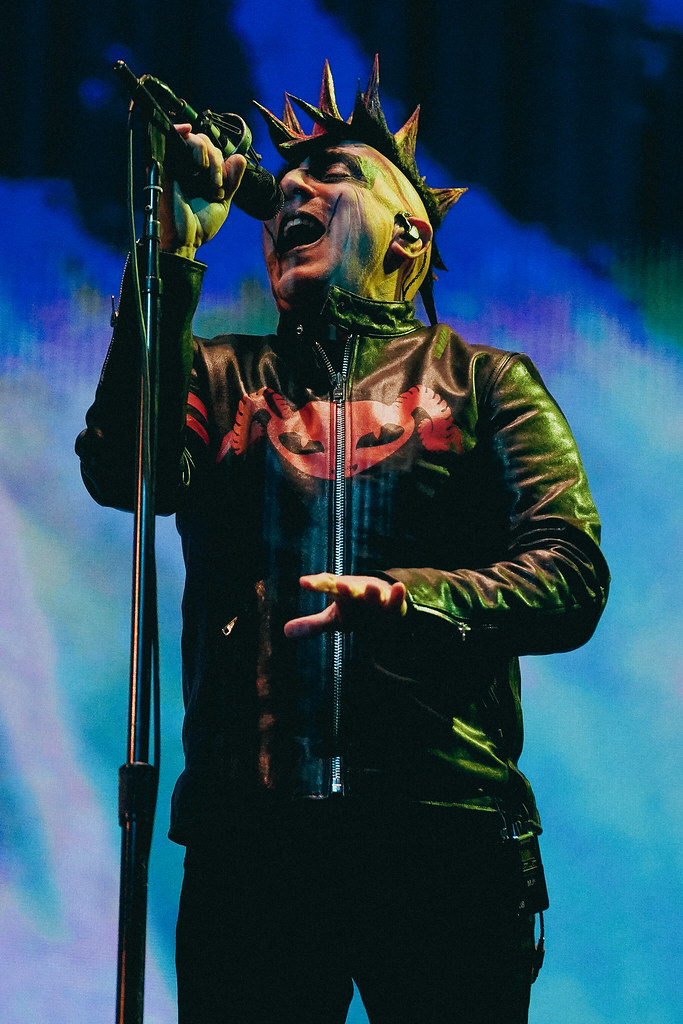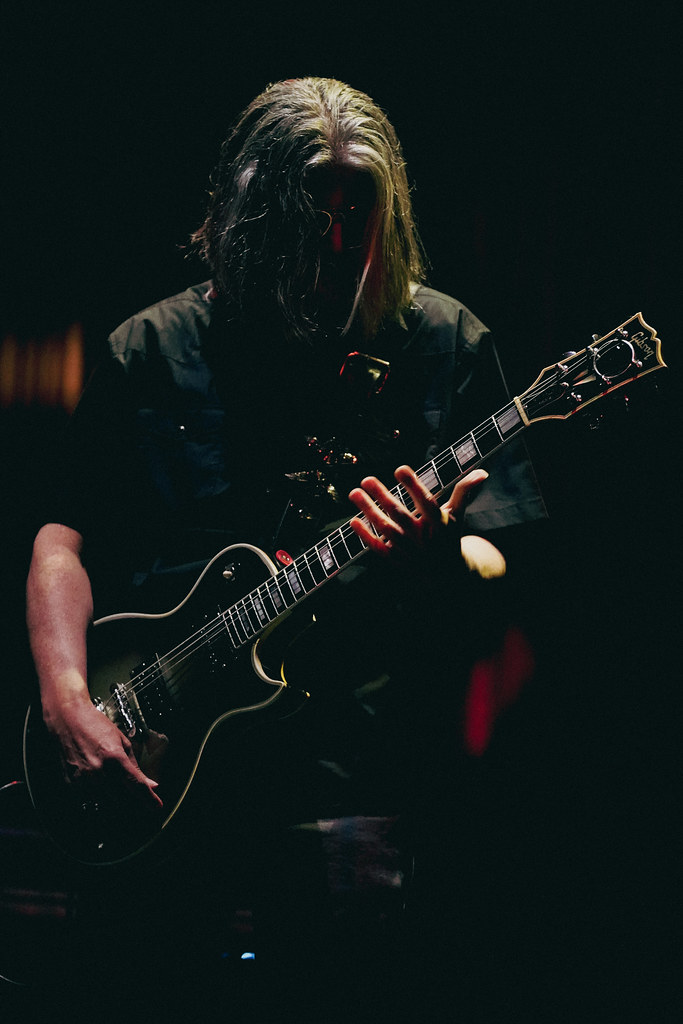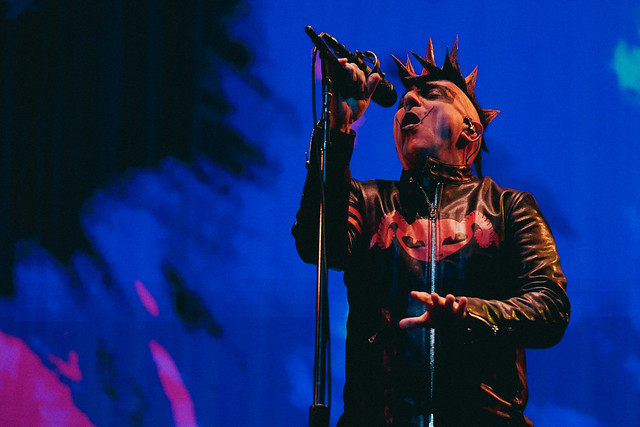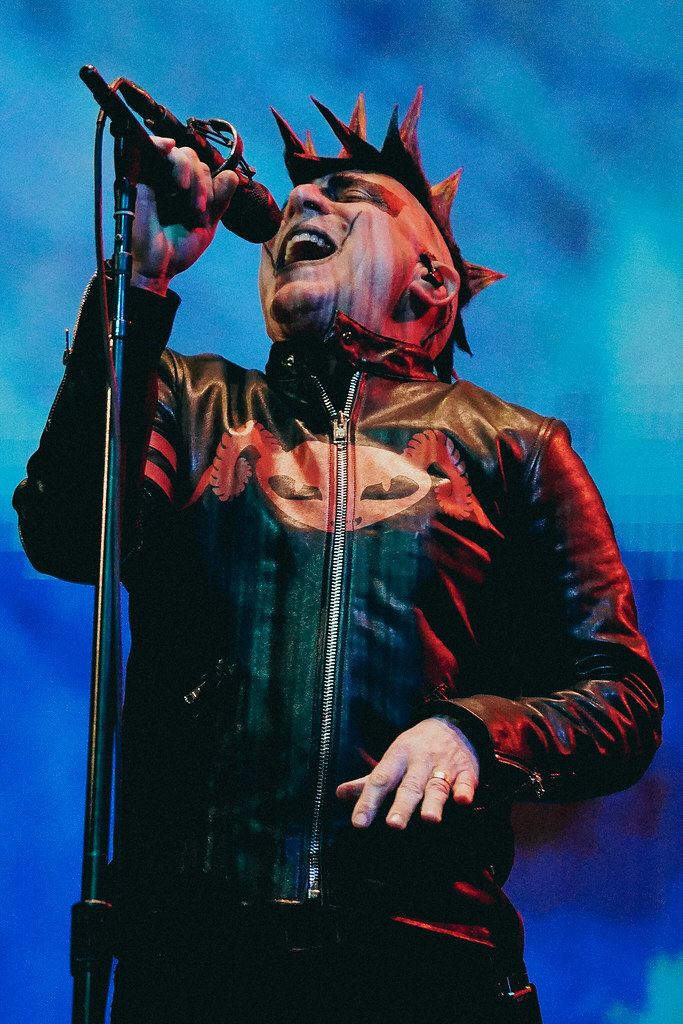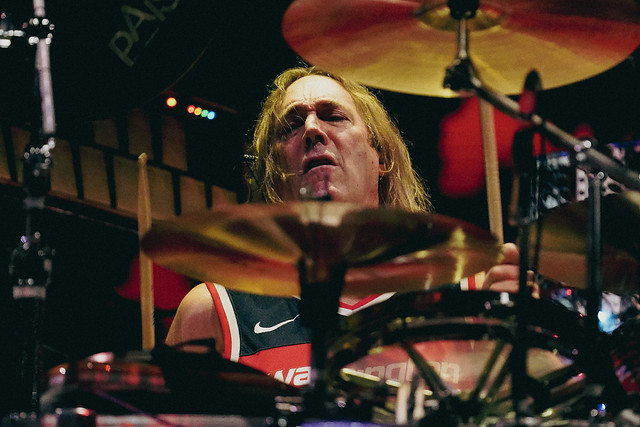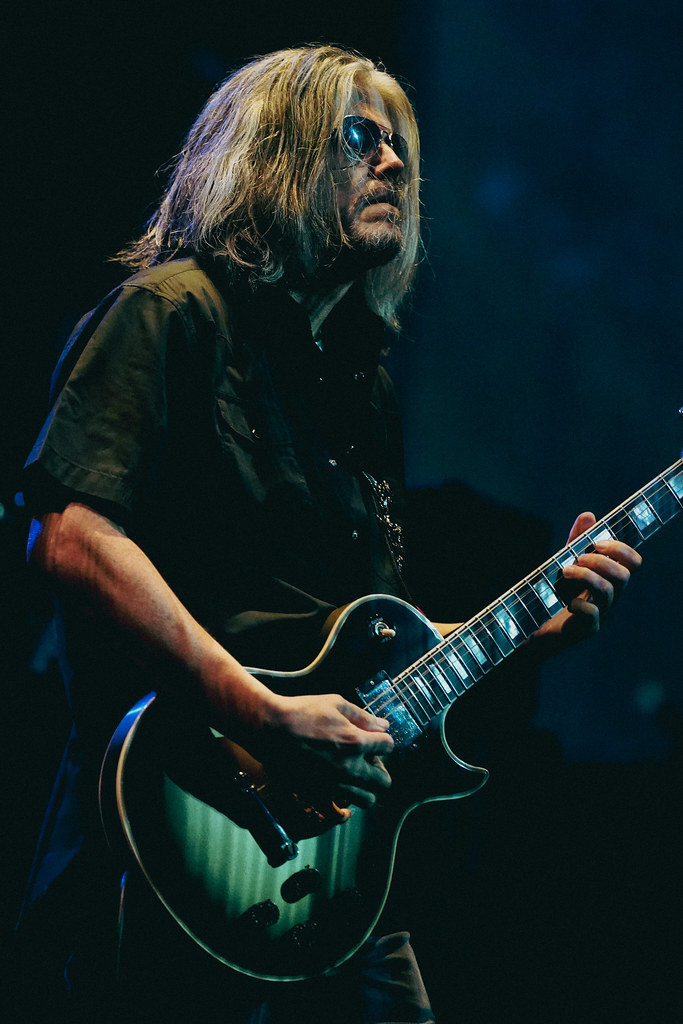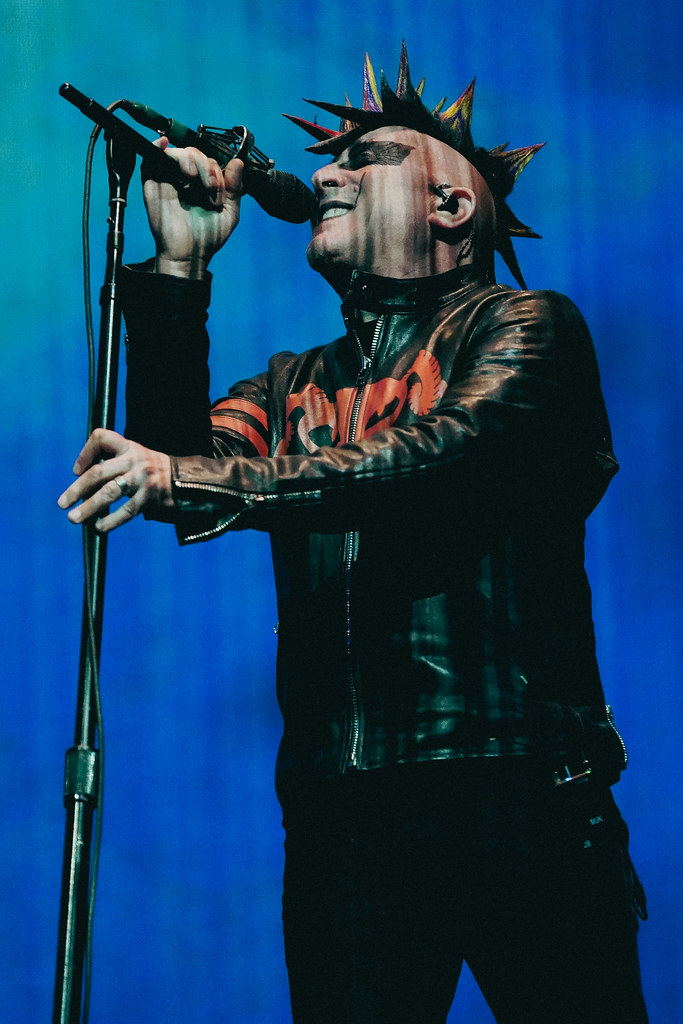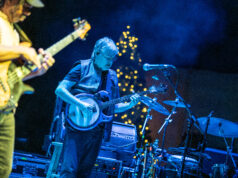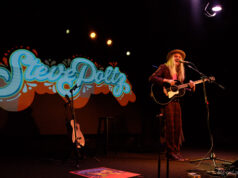
Maynard James Keenan leads Tool in a performance at Capital One Arena on Feb. 22, 2022. (Photo by Casey Vock)
It’s uncommon for a musical group of any kind to evolve into a globally recognized platform of artistic expression. But the band Tool, nearly 30 years after offering its first EP to the world, has become an ultimate vehicle for creativity and voice.
Premiering in the ’90s and establishing itself as one of the most influential and visionary bands of the era, considered a pioneer in the realm of alternative metal, Tool is likely etched in the minds of anyone who saw the startling, lurid stop-motion music videos for unforgettable songs like “Sober” and “Stinkfist” — changed to “Track #1” to air on MTV.
What might have been lost on some of its youthful fan base in those days, but is unmistakable now, is the group’s fervid pursuit of what it believes to be the right sounds, both recorded and performed live. That exploration has allowed it to cover vast ground across its studio work, effectively moving Tool from a metal band with sludge and progressive rock influences to a frontrunner of what might be called progressive metal, nu metal, art rock or, with all due respect to the music, might not really fit into any of these fabricated genres.
Haven taken nearly 13 years to release its most recent album, 2019’s highly anticipated Fear Inoculum won the band its fourth Grammy — this one “Best Metal Performance” for the track “7empest” — bestowing the band Grammy wins from three different decades. And the release sent Tool back out on the road for a major tour. But, like so many plans made in the past couple years, that was disrupted.
With Tool’s 2020 tour and what was supposed to be its most recent local appearance canceled due to COVID, the band’s recent visit to DC served as a celebration for the thousands of fans who made their way to the nation’s capital for an evening with this group that formed by chance in Los Angeles in 1990.
Packing Capital One Arena on Feb. 22, Tool proved like it has in orbital fashion over the course of its defiant existence that it is truly a one-of-a-kind entity with a gigantic sound and a never-ending spirit led by otherworldly musicianship and arguably one of the most tantalizing and mysterious figures in all of rock music — singer Maynard James Keenan.
Keenan was the last member of the band to take the stage in the huge downtown DC venue, but it was already thundering by the time he appeared on the right side atop a raised platform surrounding the elaborate drum kit of Danny Carey, long considered one of the most impressive and talented drummers on this planet.
After the intro was played over the sound system, Carey — wearing a Washington Wizards jersey, arms exposed — snugged himself into his fort and scanned all the shiny components before him. Once settled, he picked up a hand symbol, raised it carefully and struck it to initiate the live music. His factory of a kit featured vivid, psychedelic art across the bass drum head that would explode with his every kick through a set culled mostly from Fear Inoculum, and its title track would set the tone.
Guitarist Adam Jones, underappreciated not only for his abilities with a Gibson, but for his artistic eye that has fortified the band’s image, so casually felt his way into his first few movements, and what came out was a soaring, razor-sharp blast that began the night in earnest. Nailing his wide, submerging, darkly modish bars within Carey’s multidirectional torrents, bassist Justin Chancellor appeared mischievous with a nutty smile behind his beard and machine like in his speed and precision.
Like many of the compositions on Fear Inoculum, the title track has numerous sections, with seemingly more than one climax, and at Capital One Arena in DC, it played out as an epic, monstrous jam, with Carey concocting world rhythms at varying tempos one moment, then rapidly changing textures the next.
Stream Tool’s 2019 award-winning studio album, Fear Inoculum, via Spotify.
Though the construct of the songs has taken on a different form from those on Sober and Aenima, the Capital One set captured so much of what was originally captivating about the band’s earliest offerings — primarily, a remarkable exchanged between the electric guitar and bass, each giving fittings to explode in bursts as part of some of the most thoughtful and heavy ever written. Meanwhile, Maynard, delivered lines in his characteristically distant baritone, sometimes intentionally distorted, shifting from metered chant to guttural scream as the song built upon itself.
An audience as intently focused on the music as any following you might find, eyes were glued to the stage and what would become a provocative, hypnotic light and video exhibit, all choreographed under the watch of Jones. Some leaned back, mouth agape, and let the cacophony of colors and imagery — much of it ominous, dystopian, pulled from puzzling historic phenomena or contemplating the future — while some pumped a single fist in the air.
“Washington DC … allegedly,” Keenan said with a villain’s voice as the vibrations from the opening tune subsided.
The arena boomed back at him.
“Sounds like Myrtle Beach … work on it,” he smirked, standing behind his mic back in the shadows, wearing his custom leather jacket with a curious red emblem across the front and two stripes on the right sleeve.
Observing the band to start would be challenging enough in its own rite, as the night’s first few tracks were performed from behind a massive, fluttering veil of strands — much like a curtain — stretching down from high above the stage. Known to value and even demand their own privacy, it reflected the band’s attitude. Signs attached to seats sternly warned ticketholders that they would be escorted out if they used their cell phones to take photographs or video footage.
Other than a few who didn’t appear to get the memo, the crowd — including so many proudly wearing their favorite Tool garb — dug in for the long haul and were rewarded out of the gate with an amplified take on “Opiate,” the band’s first single that sounded and felt fresh with new outrage just shy of its 30-year anniversary.
Maynard’s head-turning words are as stirring now as they were in 1992, if not more so. These are lyrics that might rattle parents of teenage listeners, of any generation:
“Jesus Christ, why don’t you come save my life now?
Open my eyes, blind me with your light now
Jesus Christ, why don’t you come save my life now?
Open my eyes, blind me with your light now
Deaf and blind and dumb and born to follow
Let me lay my holy hand up, hand upon you.”
Jones — behind dark sunglasses — looked nearly effortless in yanking the most monstrous chords that could still be contained by the NBA/NHL stadium. Jones also manned a number of deck instruments to his right, always busy even if his guitar necessarily wasn’t. Chancellor — who hails from England and joined the band in ‘95 — lived it up, cranking his bass and twisting at the hips and knees with nutty pleasure and hammering rubbery thuds that bounced off the stage and then the walls of the place.
Offering a slice from across the catalogue, the night included a polished version of the “The Pot,” an infinitely rocking favorite from 2006’s 10,000 Days and “Pushit,” from the classic album Aenima.
These songs, fit in between current favorites from the newest album, showed the bridge between Tool’s early work in the ‘90s, its work in the 2000s and then its latest creation, arguably its most artistically daring and one that, over the course of its 80 minutes, plays on the number seven, incorporates concepts of evolving and reconciling what has come to be. While all the compositions were written by Jones, Carey and Chancellor, Maynard — whose notable side projects include A Perfect Circle and Puscifer — waited until the instrumentals were complete before penning the lyrics.
Watch the last music video released by Tool, “Vicarious,” a track from the 2006 album 10,000 Days:
Last week in DC, the sound flowed naturally even as it varied into different themes or moods, with the visual presentation supporting the music and capturing the minds of everyone in the room.
Additional tracks from Fear Inoculum, like the powerful, edgy “Pneuma,” only further demonstrated that the years spent working on this album was for good measure. Just as intricate and calculated as it is loud and overpowering, Tool’s music is appropriately likened to the progressive rock bands that inspired some aspects of its rich, compound, towering sound.
After an intermission, Carey flexed in the way that only he can by performing a spell-binding, ear-popping “Chocolate Chip Trip,” what might be likened to Tool’s version of the Dead’s “Drums,” but with only one gentleman in this equation. And that gave way to the band taking a seat for an essentially acoustic, meditative delivery of “Culling Voices,” which saw Danny on acoustic guitar and sparkling confetti — some of it featuring custom Tool art — floated from the rafters to create an extraordinary, visually stimulating scene across the enormous space.
Professional showmen in every way, Maynard himself would rightfully reveal the human side of this world-renown band just before the final song, as there was a medical situation in the crowd, down in the floor section, to the side of the stage.
As guards used their flashlights to quickly summon the medical staff, Maynard kept the audience engaged:
“I woke up this morning with like a sore through and a cough,” said Keenan, who has twice had and recovered from COVID-19. “Anything going around I should know about? Someone say something about a Mexican beer? … Bad jokes. I’m just stalling. Calm down. I’m not a comedian.”
As the situation was efficiently handled by staff and the room returned to normal, Keenan’s relief was palpable, even if he had relocated deeper to the left of the two platforms.
“You guys are great,” he admitted and, here, as was rumored in the crowd, he allowed the use of smart phones. “And, now you’re allowed to take out your cell phones and take shitty videos, that you’re not going to be proud and will annoy your neighbor. But you’re fucking crack-heads … ”
And as he paced to start the closer, the audacious and relentless “Invincible” from Fear Inoculum, Keenan was urgent in his commands to a few folks in the front row with iPhone lights shining bright: “Turn off your fucking lights. …. Lights OUT.”
As the speakers howled and the visuals took attendees further from Capital One Arena and to a place unknown, any attentive fan on hand would have recognized that this group’s desire for control and its history of defiance is not unfounded behavior, but most likely an essential quality.
Upon a closer inspection of Tool and as demonstrated last week in DC, the band’s intensity, its tight grip and its dedication are clearly the product of the tremendous effort put into planning and executing collective ideas centered around the notion of music as utility. As Maynard stated in an interview back in 1994, “we are … your tool; use us as a catalyst in your process of finding out whatever it is you need to find out, or whatever it is you’re trying to achieve.”
Setlist
Litanie contre la Peur (intro)
Fear Inoculum
Opiate
The Pot
Pushit
Pneuma
The Grudge
Eon Blue Apocalypse
The Patient
Descending
Hooker with A Penis
(intermission)
Chocolate Chip Trip
Culling Voices
Invincible
Here are images of Tool performing at Capital One Arena on Feb. 22, 2022. All images copyright and courtesy of Casey Vock.
